#the absurdity of the faction system
Explore tagged Tumblr posts
Text
Has anyone talked about the divergent films as a trans allegory or am I going to have to do it
#Those movies are so bad but#the absurdity of the faction system#Is such an obvious allegory for assigning gender at birth#The fact that city is in the ruins of Chicago#The fact that Chicago itself is on the ruins of indigenous land#The arbitrariness of the system#The fact it was entirely manufactured by some dude called David#I am not saying Veronica Roth intended this interpretation#She simply lacks the range#But I AM saying it makes for a way better viewing experience#Divergent#Film
24 notes
·
View notes
Note
Can you elaborate on what you think would be the minimal needed changes to fix what you see as an issue in Civ? Civ has done fairly large shifts in some mechanics before, and "civ like" is still an interesting game space that can scratch certain itches
yeah i mean as i said, the baked-in racism arises from a certain set of core assumptions that i think lock it into that position, which are that civ is a
1) symmetrical
2) 4X
game about
3) 'real world civilizations' (deeply loaded terms ofc but that's how civ envisions them)
4) trying to 'win the game'
5) with a global
6) and transhistorical
scope
so, in its role as a symmetrical (1) game with victory conditions (4), civ as a text has to take positions on what constitutes a 'successful civilization'. as a (2) 4X game this definition also has to include some variation on the profoundly loaded eponymous Xs, 'explore, expand, exploit, and exterminate'. furthermore, as a (1) symmetrical game with a global, transhistorical (5, 6) scope, it has to necessarily create a model of what 'a civilization' looks like and apply it to every 'civilization' it wants to include, at all points in their history.
this all kind of naturally leads into civ being a game in which the colonial european imperialist powers are the default 'civilizations' and all other cultures are basically just like them -- a game where technology progresses linearly and innovations are made in the order they were in european imperial history -- a game where all cultures fundamentally work in the same way and hold similar values, a game where all religions are based on christianity (i mean, just look at civ vi's system, where every religion has a 'prophet', 'apostles', 'missionaries' and 'inquisitors'), a game where not only do cultures have teleological overarching 'goals' but where these goals are shared and these goals are fundamentally based on imperialist visions of 'victory'.
to drill into some specific examples: you can't play a game of civilization without founding cities. you will constantly be founding cities. when you're playing as 'the mongols' or 'the cree' or 'scythia', this makes no sense! these were peoples who historically had rich culture, science, arts, and certainly a notable military history, but were (to varying degrees, at varying times in their history, i don't mean to create a new and similarly heterogenous absolutist category here) nomadic!
similarly, to advance in civilization you must invent 'the wheel'. 'the wheel' is necessary to many later innovations, while of course the andean peoples represented by the playable 'inca' never made significant use of the wheel because the lack of suitable pack animals and environmental factors meant that it did not, in fact, prove a suitable tool for transporting large quantities of heavy goods. for an even more glaring example, a lot of early military technology is locked behind 'horses', which is pretty absurd considering that several of the game's playable civilizations, in the real world, developed plenty of military technology despite living on a continent without any horses!
so having established what i mean by 'the issue', which is that the game's core assumptions lock it into imposing a eurocentric, imperialist vision of 'civilization' onto cultures where it doesn't make sense, here's a few different jenga blocks you could pull out to resolve it:
SID MEIER'S EUROPE
the pillar you knock out here is #5. keep the game engine and core assumptions just as founded on eurocentric imperialist societies as they are now, and just make it about european empires doing imperialism. now, i think we can immediately spot some problems in there -- how are we going to represent the rest of the world? after all, this kind of just creates a situation where, either as NPC factions or as outright exclusions, all other cultures in the world are deprived of any meaningful agency in "history". this one just kind of gives you a new problem and also from a gameplay standpoint results in a game that just Has Less Stuff On It. i think this is a bad one
SID MEIER'S ELYSIUM
now here's one you can get if you knock out pillar #3. keep the same assumptions and gameplay and transhistorical global narrative scale, but remove the 'real-world' aspects. you can get real silly with it and add fantasy stuff to it, or you can be a relatively grounded 'our-world-but-to-the-left' situation. now to some extent this already matches a lot of the features already in civ games: after all, unless you specifically load in a 'true start location earth' map, you're usually playing on a strange parallel world with semiplausible but wholly original continents! now, you also need to get some fucking Nerds and Geeks working at your company to build out your fictional world, or you'll just end having pointlessly pallette swapped a bunch of factions that are now just Schmance, Schmina, and the Schoman Schempire, and not really have avoided the issue. but if you do that, and invent a deep and rich fictional history to riff on, then you could create something really cool and incorporate alt-tech or fantasy or retrofuturistic elements or all sorts of cool shit.
the downside of this is that it makes your game less accessible and appealing to a lot of people. a big part of (at least the initial) appeal of civilization is pointing at the screen and saying 'hey i recognize that thing!'. it is instantly more accessible to someone who isn't super invested in strategy or fantasy dork shit to say to them 'you can be BRAZIL and nuke FRANCE while at war with CHINA and allied to BABYLON'.
more importantly than that, i think some parts of the historical theming (because let's be honest, it is ultimately theming, i don't think civ is interested in 'history' in any serious way) serve a pretty load-bearing role in the game's information economy. it's a pretty tall order to ask a player to remember the unique abilities of dozens of factions and unique wonders, and the historical background makes it a lot easier. e.g., it is a lot easier for a player looking at wonders to remember 'the pyramids need to be built on desert' or 'broadway will help me make more culture' than it would be for them to remember the requirements/effects of 'under-eusapia' or the 'wompty dompty dom center'. i think this is one of the number one things that, if subtracted, would meaningfully create something that is no longer 'sid meier's civilization'.
SID MEIER'S ALPHA CENTAURI
now if you cut out #3 and #5 and #6 on the other hand... sid meier's alpha centauri is not technically an entry in the civilization franchise, but i think most people correctly consider it one. it has similar 4X gameplay to the series, and its (very bad) spiritual successor beyond earth was an official entry. instead of 'civilizations', the playable factions are splinters from a colony ship that fell into civil war as soon as it landed, each one representing a distinct ideology. now, y'know, this doesn't mean it's free from Some Problems (the portrayal of the Human Hive in particular is some of the worst apects of 90s orientalism all piled together) but i think they're problems it's not at all locked into by its design!
SID MEIER'S THERMOPILAE
by cutting out #5 and #6 -- making a civ game about a particular time and place in history you could achieve something much more richly detailed in mecahnics while also being able to handwave a lot more homogeny into it. giving the same basic mechanics to, say, every greek city-state in the peloponnesian war is far less ideologically loaded than giving them to every 'historical civilization' someone who watched a few history channel documentaries once can think of. it also lets you get really into the weeds and introduce era-and-place-specific mechanics.
the scale needs to be smaller conceptually but it doesn't really have to be smaller in terms of gameplay -- just make maps and tech trees and building more granular, less large-scale and more local and parochial and specific. this also gives you the advantage of being able to do the opposite of the last two options and really lean hard into the historical theming.
if this sounds like a good idea to you, then good news -- old world does something pretty similar, and it's pretty good! worth checking out.
SID MEIER'S LOVE AND PEACE ON PLANET EARTH
what if we take an axe to #2 and #4? instead of putting all these civilizations into a zero-sum game of violent expansion, make it possible for several civilization to win, for victory goals to not inherently involve 'defeating' or 'beating' other factions. now, that doesn't mean that the game should be a confictless city-builder -- after all, if you've decided to be super niceys and just try and make your society a pleasant place to live, that doesn't mean that the guy next to you isn't going to be going down the militarist-expansionist path. hell, even if all you want to do is provide for your citizens, a finite map with finite resources is going to drive you into conflict of some kind with your neighbours in the long run.
to make this work you'd have to add a bunch of new metrics -- 'quality of life', for example, as a more granular and contextual version of the 'happiness' mechanics a few games have had, or 'equality', game metrics that you could pursue to try to build an egalitarian, economically and socially just society where everyone is provided for. after all, why shouldn't that be a goal to strive for just as much as going to mars or being elected super world president or whatever?
SID MEIER'S DIVERSE HISTORICAL CONTEXTS
ultimately, all cards on the table, if i was made god-empress of The Next Civ Game, this is the option i'd go for: jettison #1 as much as practically possible, introduce as much asymmetry into the game as you can. some civilizations keep the established settler-city model -- others are nomadic, building their units in movable 'camps' -- maybe the 'colonial' civilizations, your USA and Brazil and so on, can be like the alien factions from the alpha centauri DLC, only showing as NPCs at the appropriate point in the timeline when other civs are colonizing other continents, or putting you into an accelerated-forward version of the game if you choose to play as one.
you could combine this with a more interesting version of humankind's civ-choosing system, where you lock certain civilization choices behind specific gameplay events. this would let you do crazy shit with the balancing -- imagine an ostrogothic kindgom civ with crazy strong abilities and units that you could only choose to play as if your capital is overrun by barbarians, or a hungarian civ that requires you to have started as a nomadic civ and invaded somewhere, or a soviet union civ that requires you to lose a revolution, or a usamerican civ that requires you to split off all cities on a foreign continent from your original civ -- you could add so much variety and so many new and bizarre strategies into the game with this!
as for the universal aspects of tech and the narratives of linear progression contained within, there are lots of approaches that already solve this! stuff like stellaris' semi-random branching tech paths, or endless space 2's circular tech web, could allow civilizations to take tech paths that make sense for them, rather than imposing one single model of 'technological progress' on the wole world.
obviously there's limits to this, right -- civilization isn't going to be a detailed historical materialism simulator any time soon. but i think abandoning the idea that every faction has to play fundamentally the same and introducing some severe asymmetry as well as choices that you can make after starting the game would work wonders to wash out some of the racist and colonialist assumptions built into the game's foundation, while also (imo) creating a more fun and interesting game.
1K notes
·
View notes
Text
Assassins With a Smile: Veilguard’s Crows and the Neoliberal Fantasy of Elite Violence
In Dragon Age: Veilguard, one of the most ideologically revealing choices is the elevation of the Crows—a privately-funded, aristocrat-aligned assassination mafia—as the “reasonable,” “pragmatic,” and even morally preferable faction.
From a materialist or leftist perspective, this is completely absurd.
From a neoliberal “only the competent elite matter” perspective?

It’s textbook.
Fantasy Mafia, Market-Approved
Historically, the Crows have been portrayed as a dangerous and murky force in Dragon Age lore: tied to political assassination, noble power games, and mercenary corruption. In Veilguard, however, they’re recast as Antiva’s best hope for order. Not justice—order. The message is clear: yes, they’re a velvet-gloved knife-wielding death cult, but they’re our velvet-gloved knife-wielding death cult.
The game positions them against Ivenci, a civil reformer who wants to build a real justice system not beholden to mercenaries. But Ivenci is ridiculed—portrayed as fumbling, overly idealistic, out of their depth. Despite the fact that their proposal—building a civic institution not held hostage by mafia violence—is objectively more just and more sustainable.
This is narrative rigging. It's a rigged ideological binary:
Community violence in sexy coats vs. goofy bureaucratic reformer.
A Fantasy of Grassroots Violence (for the Elite)
And then comes the final blow: Ivenci, who once stood for structural reform, ultimately sides with the Antaam—the game’s imperialist invading force. It’s a real betrayal, framed not as a tragic misstep, but as confirmation that civic reformers are untrustworthy power-seekers.
Instead of showing how power corrupts across factions, the game uses Ivenci’s fall as an ideological shortcut to erase the entire premise of state-building or institutional justice. They're imprisoned, discredited, and narratively discarded—clearing the path for the Crows to emerge as the “pragmatic” default.
This isn't complexity. It's a sleight of hand. It says:
→ “The only people you can trust with power are the ones who already have it.”
→ “Don’t build justice—outsource it to the velvet-gloved aristocrats.”
It’s an Ayn Rand worldview, dressed in Bioware romance dialogue.
Neoliberal Logic in a Dagger Sheath
The rehabilitation of the Crows follows the classic neoliberal pattern:
Institutions are weak.
The people are disorganized.
Reformers are foolish or corruptible.
Power belongs to those who wield it efficiently—and attractively.
The Crows aren’t grassroots. They’re aristocracy with better lighting.
Calling them “what’s best for Antiva” is like calling a hedge fund good for your local school district.
And yet, Veilguard sells them with a straight face.
Assassins, Rebranded as Community Leaders
The game doesn’t critique the Crows—it markets them.
We’re not invited to question their structure, history, or legitimacy. We’re invited to romance them. Align with them. Accept their violence as “necessary.” It’s a fantasy of privatized justice, sold as stability—and one where the public never gets a seat at the table.
In a series that once explored mage rebellions, chantry corruption, and religious revolution, Veilguard trades in its radical edge for something safer:
Sexy murderers who keep the wheels turning.
Final Thought:
If the “reasonable, grounded” option is a fumbling, noble-funded assassination guild that keeps dropping the ball—and your game still treats them like the good guys...
...You’re not telling a story about justice.
You’re telling a story about why the powerful deserve to stay in power, no matter how many times they fail.
#veilguard critical#dragon age the veilguard#bioware critical#da:tv critical#veilguard spoilers#dragon age critical#a lot of thoughts on veilguard#da: the veilguard#veilguard is neoliberalist accidentally#im not saying the writers are bad people#they just didn't think enough#this is kind of a quickie so plz let me know if I missed or misunderstood something#Did you notice that only the elite like Lucanis get second#third#fourth chances.
94 notes
·
View notes
Text
Ever stopped to think about how terrifying Super Earth and The Helldivers must be from the enemies perspective?
Even though the game is satire, Super Earth and, most specifically, The Helldivers, are genuinely kind of terrifying when you see them from the enemy's POV. Not only do you have this massive galactic empire who took out a hyper-advanced race a century ago in the First Galactic War using considerably less advanced technology, but the same hyper-advanced race is finally back trying to square up against us again and getting their ass beat, all while our technology hasn't changed much since the first war. All of this because we are simply just too goddamn patriotic to our home planet to lose it. Our strongest weapon is literally our determination and devotion to Super Earth.
Think about it. You are an Automaton facing down a Helldiver. You ambush them from behind and blast a laser into their back. Without missing a beat, they jump forward, turn 180 degrees and pop you in the chest with their Senator. As you fall to the ground with your vision getting static-y and your systems shutting down, you see them stand up, stick a needle into their neck and shout "MY LIFE FOR SUPER EARTH!" as they sprint off unfazed to a random direction.
The Helldivers, despite how much Arrowhead seems to have wanted to make us look like glorified red shirts, are genuinely an elite force compared to standard SEAF troops.
Let's summarize this:
* We can handle multiple different types of weapons extremely proficiently, including being accurate while running AND diving to the ground, two things that are extremely difficult to do in real life.
* We can sprint for fourty minutes almost non-stop for multiple miles and back to complete our missions, not to mention do a variety of different moves that show off our agility such as the aforementioned diving but also sliding on the floor and climbing large surfaces.
* We can be set on fire, blown up, shot, fall from great heights and suffer multiple different types of terrifying injuries but not only manage to keep our cool but also recover from said injuries using simply some sort of highly-advanced "medicinal" drug that lets us keep fighting like nothing happened.
* A team of four is all that's required to be sent behind enemy lines to perform highly dangerous suicide missions that involve destroying enemy logistics, recovering intel and other types of sabotage in the style of WW2 Paratroopers. Keep in mind these missions are usually not done stealthfully at all and we're often fighting off entire BATTALLIONS of enemies that could easily crush any other 4-man squad. But not the Helldivers. The mental fortitude required to not cave in this sort of situation has to be extremely strong (and patriotic).
* Despite suffering major losses on multiple planets, we are still by all means winning the war and causing major damage to 3 different enemy factions. In one year, we have already killed BILLIONS of enemies on three fronts which is vastly more than our own number of KIA divers (though for full transparency, it is likely many more humans have died whether them being civilians our unseen SEAF personnel, but their numbers are unknown).
* Overzealously brain-dead fanatics, who not only lack fear of death but actively embrace it. (From a militaristic perspective, this is incredibly strong to the point of being absurd. Think of unbreakable units in Total War. All for Super Earth!)
* Exceptionally efficient killing machines. (Their flawless handling of both weapons and equipment suggests they've been trained from a very young age.)
* Access to top-tier technology designed to be both highly reliable and cost-effective. (You can literally drop a bomb on their gear, and it will still function perfectly. They just leave it behind and request a replacement like it's nothing.)
* Complete dehumanization of the enemy due to relentless propaganda. (With constant broadcasts and a star destroyer-sized screen blasting their ideals, even during downtime, they're never free from it.)
* An auto-regulating regime that enforces and encourages constant surveillance among individuals, making the populace their own "prisoners and wardens." (Ties back to the previous point.)
* Absolute obedience and fanaticism from both military and civilian sectors, ensuring a continuous flow of soldiers-whether motivated by "faith" or fear. (Again, see previous points.)
* A completely unstoppable war machine that will keep throwing bodies at you. No matter how many you kill, they'll keep diving. Again... and again... and again... and again...
In short…
BUGS, BOTS, SQUIDS, WE MUST KILL THEM ALL!
LEAVE NO ONE ALIVE!
BURN THEM TO THE GROUND AND SALT THE EARTH!
MY LIFE FOR SUPER EARTH!
Don't let the dissidents fool you into believing The Helldivers are just expendable fools who don't last long in the battlefield. If that were true, we would not be causing as much damage as we are now. Even with our heavy losses, each death is the torch of freedom passed from one soul to the next, be their survival time a mere 10 seconds or an outstanding 40 minutes. Democracy is smiling to us from the skies above and we are doing it proud!
105 notes
·
View notes
Text
have you been enjoying absurd Helldivers 2 nonsense?

multiple players have independently called my compared my satirical scifi skirmish storytelling TTPRG 🎲 PLANET FIST to Helldivers—so much as to call it "exactly the tone of Helldivers." the new Faithless Edition of PLANET FIST will be releasing this year, and if you buy it now, you get the new edition for free!

in PLANET FIST, SHOOTOUTS ARE STORIES, and they're goofy and over the top. you're an undying, unsleeping soldier who can get blasted to bits and thrown right back onto the battlefield next round. if you're looking to see how it hits that Helldivers tone, just check out some of the FACTION TRAITS below!

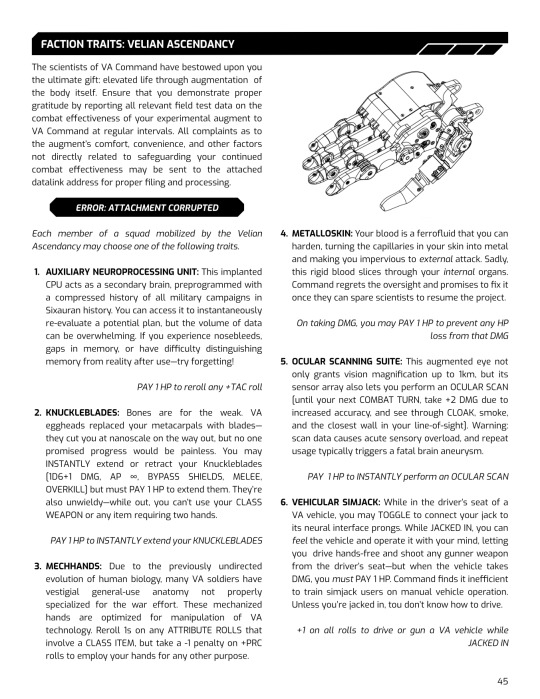
what's PLANET FIST about? what does it play like? read the PRINCIPLES OF PLAY here!

what are people saying about PLANET FIST, besides that it's like Helldivers 2?
"PLANET FIST is a quick-to-learn and quick-to-play system for characters thrown into FPS-style deathmatches on a world that knows nothing but war. It's a game of high-emotion, low-consequence combat, for when you're wondering what the infinite Master Chiefs are thinking during Halo multiplayer. PLANET FIST is 'war never changes' said with the same inflection as 'it's all made up and the points don't matter.'"
- Caleb Zane Huett, designer of Triangle Agency
"An absolute blast—and then another, and then another, and then another, each leaving remains splattered on a wall. Gleeful, and tactical, and winkingly tongue-in-cheek; a masterful game from top to bottom."
- Jeff Stormer, host of the Party of One actual play podcast
or check out some table stories:
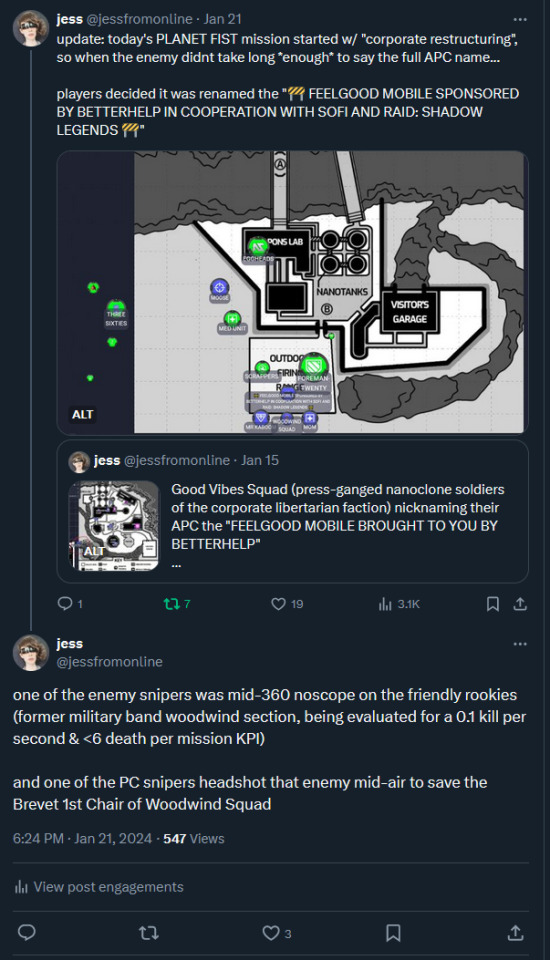
#Helldivers#Helldivers 2#TTPRG#TTRPGs#PLANET FIST#my work#my games#scifi#military scifi#milscifi#Starship Troopers
322 notes
·
View notes
Text
Operator/Drifter headcannon bc I saw someone else do it and now I have to.
Lets start with the name thing.
Operator doesn't even remember their name. Everything before the Zaramin is a fuckin blur. Memeories even of their family are basically non-existant and the ones they do have they dont want to dwell on. They see no real reason to have a name outside of a way to be refered to and are pretty content with whatever nicknames they're given.
Tenno feels more like a professional title. Like they're one of the tenno. Lotus' little helper come to do a job. While Operator is more personal to them seeing as how Ordis gave it to them and they consider Ordis to be a friend.
Operator also doesn't really have a great concept of self in any way. They've been deeply dehumanized for so long that they dont really view themselves as a person. Or perhaps they dont really view anyone as a person. Ordis is as much a person to them as Kahl is. Or Little Duck. Or anyone on the Zaramin. In a way they view almost everyone as equals. Though they dont view almost anyone in high opinion either. The major catagories in their mind is Ally (which implies affection and also responsibility) or Enemy. Or the secret third catagory which is Leader. Lotus and Teshin dominate this catagory though ordis and Umbra are starting to bleed into it as well. As allies whose judgemnt they trust enough to take an order from them.
Another side effect of their dehumanized disposition is that they have little to no concept of identity. Gender is meaningless to them as they're too young to display sex characteristics. They're pretty androgynous. Thier "style" is based on utility and ease. They have no concept of attration. They also have very few opinions on matters that dont concern their work. Its only with the encouragement of the different faction in the system offering them clothes and decore as well as Ordis making space for them to decorate and the various wildlife tag traders offering them floofs that has led to any want to customize their space.
It started with the floofs. Each one was a trophy. And Operator enjoys collecting trophys. So they aquire far too many. A truly absurd amount. And because of their tidy and formal disposition are forced to find a way to neatly arrange them. One case in the orbiter becomes dedicated to floofs from daimos. Another to floofs from earth. The couch starts collecting the really rare floofs. The vaska Kavats, being infected become a priority to hunt and capture and the case containing thier floofs quickly overflows onto the floor in front of it until Operator simply stops trading the tags in. There are various canine floofs nestled around the meditation window and pobber floofs aranged on the table. Velocipod floofs hung on the wall and arranged by color.
The orokin fish go in the fishtank display.
And eventually they decide that yeah, this room could use a paintjob. And that leads to the ship and the equipment and even their frames getting special skins and paintjobs. If you asked the opperator what their favorite color is they probably wouldnt know how to respond. But there is deffinitly a theme going on with their frames. They might have had one a long time ago if the way their features have been customized are anything to go by. Vivid unnatural hair and eyes. But that was so long ago, before the war. They hardly remember.
Operator also doesnt speak much. They can just fine. They dont have difficulty with it. They just dont unless it seems necessary.
As a side effect of centuries of over useing transference pods, as well as lingering damage from void touch and orokin abuse, Operator suffers from muscle and joint problems, Migranes, and fatigue. This doesn't lead them to use transference less but actually to rely on it more. Warframes are of the easiest ways for them to navigate the system. Both physically and because many wont treat them the same if they look like a child. Stasis means their bodies need less maintenance than it would if they were walking around all the time. But it also means they get less maintenance. Which is a form of neglect.
Operator does have a lot of investment in the communities they have allied with. Cetus and Fortuna are very important to them. They feels both responsable for and beholden to those allies and will funnel an inordinate amount of resources into those communities with the goal of illimnating suffering. Kahl's camp, the Necralisk, and the chrysalis less so. If only because they have a lot less need of Operator's help. They're pretty self sustaining.
Though opperator may glean a lot of joy out of their accomplishments, and the defeat of their enemies they arent cruel. Cold sure. But not cruel. Kahl and his very existance proves to operator that there is no truly evil faction. Only enemies. Once any group decides to no longer be an enemy Operator affords them she same neutral respect they offer any sentient. With the exception of the infested which are obviously not really sentient. And are illiminated with efficiency. Operator does not mour their enemies but neither do they bathe in blood.
Operator has a special connection with Umbra. There are many other frames that they enjoy piloting but most other frames have a far lower level of sentience left. They register more as a machine whose identity must be respected in the same way that you respect a lake on earth by not polluting it. Or respect a flower waving in the wind by stepping around it. Its an acknowledgement, an acceptance, care in a lack of cruelty. But not effection. Some though have more personality, maybe a couple memories. Enough personality left to influence Operator's mind and behavior when they pilot them. Not like Umbra. Hes still a man in many ways. Or at least every ounce of anger that one made up a man, cut out and turned to metal. They understand each other on a far deeper level. Umbra and Operator exist separately but move together. Either able to take control. The other only needing to be asked to relinquish it.
Both are quiet. Both broiling with anger and betrayal that may never fully fade. But both looking foreward to a more peaceful existance. Enjoying making their own decisions and choosing which causes to occupy themselves with. The loyalty that they feel to Umbra surpases any other relationship. And they mark themselves with it. Jewelry, bandana, maching colors and outfits. Even the papermache mask that they frequently wear.
Though very adult in their demeanor there is something undeniably childlike about them. From their massive floof collection to the mask or the ventkid comics or the way they curl up in the corners of the ship, under a blanket, tucked into their fluffy companion. When no ones watching, Operator is very childish.
Now Drifter. Drifter is different. They also dont have a name. Not because they cant remember but because they've chosen to leave it behind with their parents. A memory too painful to let anyone else speak it again. Drifter remembers who they were before but they consider that person to be dead. Drifter is generaly more outgoing and much better socialized than Operator. With thoughts and feelings and opinions that they arent afraid to share.
They do have a vegue idea of gender. If only because their body has developed to look more one way than the other. Though they generally dont concern themselves with the concept unless their buying clothing. They present Masculinly with the exception of pretty flower tattoos and soft pretty accesories. Lots of plants and gold and stone in their style.
They're dressed more casually than Operator as well. Less battle armor and more actual fabric. Real leather boots. Fun jewelry. Belts and chains. Funky hair styles. Drifter knows what their top five favorite colors are and what colors they associate with every frame. Drifter collects all the music. Loads up the somacords.
Drifter also took over most of the big decoration jobs. Operator collects things. Posters, floofs, art, toys, noggles. But drifter puts them up around the dormozone. Drifter picked out the furniture and saved up for the bird from duviri. Operator makes sure they the noggles are all equally spaced, and that their master sigils are displayed. But Drifter hangs the posters and sets up the holograms and programs the warframe ladout displays.
Drifter chooses the view out the window and grinds for ayatan sculptures. And bought ordis a body.
Drifter is far more concerned with the void factions than Operator. Concerned with taking care of those still on the Zaramin. Or the sanctum anatomica. Or the Hex. Drifter is also far more concerned with Entrati. Not that operator doesnt care but theyre still wrapped up with lotus and the end of the last war, and rebuilding from it. In many ways Operator is a vet after the war is over and the Drifter is already getting deployed again.
Drifter is also more personable. They have friends. They have rivals. They have a partner. Unlike Operator who views the Drifter as a different person entirely, Drifter sees operator as themself. Their memories are so scrambled like puzzle peices shaken in a paper bag, but theyve seen enough from Operator's mind to just shrug and accept that as their past as well. They share a lot. Not just memories and an apartment. Also frames and friends and a purpose.
Drifter sees them as real as their own past, just occuring congruently.
Drifter likes Umbra, a lot actually, but recognizes the connection he has with Operator and accepts it. No jealousy. After all Operator is them. And they just need him more. Drifter also likes taking the rest of the frames put for a jaunt. Isn't too picky about which ones. Though both of their opinions seem to mostly align on that front.
They have a generaly similar proficiency with weapons though Operator's tends to be nearly identicle to their chosen frames signiture weapons while drifter is all about flashy, high damage, and cool effects. While Operator sticks with efficiency and status effects.
Drifter loves prime weapons and incsrnons.
Drifter is also quite partial to Sun and Moon, though maybe not as much as Operator weirdly. Operator upon discovering Teshin gifted them Dax swords almost fainted with envy. Drifter helped them craft a set as soon as they could. Qnd though Operator can't weild them beacuse of their size. Umbra almost never puts them down.
Drifter encourages Umbra, Operator, and Teshin's general retirement behaviors. Bringing back seeds for their garden. Books for them to read. And tea to drink. Operator often reads to the other two. Drifter encourages Operator to take more and more time away from missions and teshin helps guilt them into staying out of stasis longer. Eating and drinking. And doing simple excersizes.
Operator's favorite allies are Konzu and Hai-luk, while Drifter's are ticker and Bird 3. Hex not withstanding.
Neither really like doing missions on the Zaramin but Drifter does them to study the void and try to learn more about it. Drifter also feels extreme guilt about having Jade as a frame, though justifies it as part of their void/infested research and tries not to think about how pissed stalker would be if he knew.
This is already thought vommit so im gonna have to call it. But i had way more thoughts on this than i thought. Damn.
#warframe#warframe drifter#drifter warframe#warframe operator#operator warframe#excalibur umbra#warframe teshin#teshin dax#the hex
29 notes
·
View notes
Note
dont understand why people look at classpect and see it as "oh a x of y is this and will always be like this" instead of "this character is like this, and as such can be categorized as a x of y"
even within that framework its still super sloppy (what makes someone a witch instead of a maid) but i just dont get how so many people look at the system and think they should apply it prescriptively
frankly i think this approach is similar in its fruitlessness to trying to determine whether Homestuck's world is deterministic or has free will (it clearly invokes both, because its philosophical goals lie elsewhere). classpect can't be prescriptive because that requires the existence of some narrative force which can predetermine what it wants for the characters and then somehow compel them to follow that path, which explicitly is not true - but it also clearly isn't descriptive, or else you're left to assume that either a) people are unchangeable (a thematically important but philosophically unconscionable position) or b) classpect is changeable, which we can surely agree is absurd.
classpect isn't prescriptive or descriptive because it is essential. John Egbert doesn't 'act like' an Heir of Breath, he is the Heir of Breath: an Heir of Breath acts like John Egbert because that's just who the Heir of Breath is. put another way - far more infuriating, but cutting far more directly to the point - John is the Heir of Breath because he was written to be, and for literally no other reason.
this cuts to another fundamental problem with popular classpect which is that there does not seem to have been any meaningful line drawn between classpect as a "tool for analyzing characters" and classpect as a tool for inventing OCs. you will occasionally hear platitudes along the lines of 'no two Thieves of Light will express their classpect in the same way', but this is not a statement that actually has anything to do with the content of Homestuck as a story - as far as Homestuck is concerned there is one Thief of Light and her name is Vriska Serket! to abstract the Thief class from its explicit purpose in the text and use what we know about Vriska to determine what a completely hypothetical 'Thief of Time' would be like is no longer to be analysing Homestuck: the classpecter is now attempting to use their rigid understanding of in-universe rules to determine the future direction of a creative endeavour, which is called theorycraft. it's anathema to serious adult literary analysis.
ok what point was i even making. basically the larger classpect debate seems to be split primarily between the 'it is very cool to think of classpect as fatalistic' camp and the 'it's more forward-thinking to view classpect as merely descriptive' faction and while i am absolutely firm in my belief that the former (which holds the clear majority) is an outstanding example of Chud Thought and i sympathise with your position with the latter, I am personally far more inclined to take the fabled Middle Road Of Nuance which is that classpect within the text clearly IS fatalistic, but maybe that's a bad thing and just maybe the story wants us to see that that's a bad thing..............?.......?!
25 notes
·
View notes
Text
Matt Johnson at The UnPopulist:
Joe Rogan, a UFC commentator and comedian who hosts the most popular podcast in the United States and possibly the world, has developed a reputation as an anti-tribal and fiercely independent voice who is beholden to no political party or faction. In the eyes of his regular guest Jordan Peterson, Rogan is “the most powerful journalist who’s ever lived,” and he has managed to gain such broad appeal because he “just asks questions.” But the notion that Rogan is an honest broker of information who has an overriding commitment to the truth is absurd. In fact, he has only one consistent mission: attempting to debunk mainstream media narratives by entertaining conspiracy theories. He’s more of a populist than a non-partisan—and he’s definitely no truth-seeker. Nothing illustrates this better than his warmly favorable treatment of both Donald Trump and RJK Jr., along with the parade of other cranks he features who peddle outlandish conspiracy theories and constantly congratulate themselves for being “anti-establishment” or “heterodox.” The effect, whether he intends it or not, is to overwhelm our epistemic infrastructure and pave the way for dangerous populist demagogues.
The Most Popular MAGA Pundit in the World
In his much-discussed interview with Trump last week, Rogan’s approach was to first encourage Trump to air his typical barrage of conspiratorial falsehoods—and then to endorse them himself. Take, for example, the segments on elections and voting, which were always shaped by Rogan’s MAGA-friendly framing. When Rogan told Trump that “a lot of weirdness ... was going on during the 2020 elections,” he was basically affirming Trump’s Big Lie and ignoring the fact that the 2020 election was the most scrutinized contest in American history. The rest predictably followed:
Trump claimed that “old-fashioned ballot screwing” had taken place, such as “people ... dropping in phony votes.” Rogan agreed.
Trump claimed “the Russia hoax” swayed the 2020 election. Rogan agreed.
Trump claimed the temporary suppression of the Hunter Biden laptop story also swayed the election. Rogan agreed.
Trump claimed Democrats weaponized the justice system against him. Rogan agreed.
Trump alleged that Democrats are opposed to certain forms of voter ID “because they want to cheat.” Rogan responded: “It doesn’t make sense any other way.” Voter ID laws are a solution in search of a problem, given that there is little evidence of widespread voter fraud, but Rogan preferred to attribute to Democrats the most sinister motivation imaginable. Rogan also said “mail-in ballots are a problem” and worried about vote-counting machines getting hacked—a version of a famously discredited conspiracy theory for which Fox News had to pay $787 million in a settlement with a voting systems firm for pushing it on its airwaves.
When the discussion turned to the topic of denying election results, it was the perfect opportunity for Rogan, the interviewer renowned by fans as a tenacious truth-seeker, to press the most high-profile election denialist American politics has ever seen. That’s not what happened. Instead of challenging Trump’s years-long insistence that he actually won the 2020 election, or his enlisting of attorneys like Sidney Powell to claim communist-designed voting machines rigged the contest against him, or his attempts to overthrow the election by sending fake slates of electors to Washington, or his incitement of an insurrectionary mob at the U.S. Capitol to halt the certification of the vote, Rogan brought up ... the Russia investigation. Democrats are especially prone to denying election results, he told the man who believes he beat Hillary Clinton in the popular vote in 2016 and Joe Biden in the Electoral College vote in 2020.
But the segment on elections and voting wasn’t only about 2020. Consider their exchange about Haitian migrants in Springfield, Ohio. After Trump declared that Democrats had turned Springfield into a “horror show” by “dropping” immigrants into the community, Rogan’s follow-up wasn’t to press Trump for corroboration, given that state Republican officials said this was nonsense and have asked Trump to stop endangering an innocent minority group. Instead, Rogan asked Trump to hypothesize about what must be motivating Democrats to allow a flood of immigrants into the country. As if that was not a loaded enough question, Rogan then proceeded to say this: “One of the things that’s been very clear is that they’ve moved a large percentage of these migrants—they’re coming across the border illegally—[into] swing states.” Never mind that the Haitians in Springfield are legal. In one fell swoop, Rogan managed to seamlessly transition from asking a question about immigration to asserting the Great Replacement conspiracy theory that Democrats are importing illegal voters to steal elections—exactly Trump’s view.
[...] Rogan’s embrace of RFK Jr. isn’t ultimately down to his personal charms—Rogan is dependably supportive of health and wellness conspiracism just generally. During the Covid pandemic, the Joe Rogan Experience was among the most formidable engines of misinformation about the disease, alternative treatments, and vaccine safety, with appearances by conspiracists like Bret Weinstein, Robert Malone, and Pierre Kory. He regularly invites conspiracists onto his show to pump out hours of uninterrupted anti-vaccine propaganda. Alex Jones—one of the most prolific and notorious conspiracy theorists of our time, who accused the grieving families of Sandy Hook victims of being crisis actors who were part of a plot to take Americans’ guns—has been a guest many times. Conspiracy theorists like Weinstein who rant about the horrors of vaccine injuries, the life-saving properties of ivermectin, and the totalitarian machinations of the WHO for long stretches, are honored guests.
[...]
Heterodox Media Has a Right-Wing Conspiracism Problem
Rogan has presented his podcast as a counterweight to the “establishment” media. That means he regularly platforms figures that traditional outlets won’t because they don’t meet basic journalistic standards. He evades accountability by always pointing out that he’s a mere comedian and entertainer, a clever rhetorical shield. This grants him the latitude to speculate as recklessly as he wants, indulge some of the wildest conspiracy theories around, and consistently get basic facts wrong while allowing his guests to do the same. So long as his audience laps it up, he has no reason to approach things any differently. But that’s also why the backlash from Trump’s MAGA base was so threatening to him: that’s an occasion in which he risked losing his audience. Rogan has become wholly captured by his audience even as he maintains the pretense that he’s a fair-minded and inquisitive political observer who is capable of seeing through what he regards as the sinister machinations and distortions of both major political parties. That’s why, when the wave of MAGA resentment came crashing down on him when he endorsed RFK Jr., he caved.
Kamala Harris’ supporters never expected Rogan’s endorsement, and there’s no Democratic equivalent of Catturd to chastise Rogan for supporting a third-party candidate. Nor does Rogan have much of a non-right audience. So all his incentives lean in the direction of becoming a right-wing conspiracy theorist—especially since, right now, there are more conspiracies on the right. Indeed, there are few, if any, MAGA conspiracy theories that Rogan hasn’t amplified. Last year, he suggested that Jan. 6 was a “false flag” operation in which “intelligence agencies were involved in provoking people into the Capitol.” He defended Arizona’s Republican senatorial candidate, Kari Lake’s, debunked claims about voter fraud in her state’s gubernatorial race: “All that Kari Lake stuff in Arizona they tried to dismiss, it doesn’t look like that’s invalid. It looks like there’s real fraud there.”
Rogan, of course, isn’t the only one. There is an entire industry of self-styled “heterodox” thinkers who have gravitated toward the right. Peterson, Rogan’s frequent guest, was once merely critical of campus identity politics and other forms of “wokeness.” He’s now a committed political partisan indistinguishable from a standard-fare Fox News commentator (e.g., characterizing Harris as “a master of chaos and deception” who is full of “envy” and “spite”; or describing Trump’s indictments as a “horrible” form of political “persecution”). Rogan and Peterson are part of an alternative media community providing an intellectual permission structure for people to support MAGA under the guise of “independent thought,” “heterodoxy,” or “classical liberalism.”
But Rogan plays a crucial role in this right-wing alternative media ecosystem. Because he has always presented himself as non-partisan, millions of listeners trust that he doesn’t have an agenda. Heterodox intellectuals and influencers like Peterson constantly decry traditional media as captured by elite interests, and they present shows like the Joe Rogan Experience as the alternative. But when Rogan and his guests shower praise on Trump and relentlessly attack his political opponents, they prove that they aren’t the anti-establishment crusaders they claim to be—they’re just supporting one establishment over another. In many ways, Rogan is the perfect embodiment of the Trump-era podcaster.
Joe Rogan claims to be an independent voice, but is in reality a right-wing conspiracy theorist whose podcast has a largely MAGA audience.
#Joe Rogan#The Joe Rogan Experience#Conspiracy Theories#Donald Trump#2024 Presidential Election#2024 Elections#Conservative Media Apparatus
45 notes
·
View notes
Text
Duncan does a quick compare-and-contrast episode on the German Revolution, and points out that:
Kaiser Wilhelm bowed to pressure to switch out his government much faster than Tsar Nicholas
The SPD was immediately hostile to the spreading workers' and soldiers' councils in Germany--Friedrich Ebert, despite heading the SPD, is really hostile to the idea of a social revolution like occurred in Russia, and thinks the SPD can win socialist goals in a parliamentary system because of its electoral strength. (This is not absurd on its face--Russia at this point is in civil war and there are competing Red and White Terrors; the SPD is electorally strong, though the weakness of the parliamentary system Germany will get will prove to be a huge problem)
Prince Max shoves the Kaiser out the door by announcing his abdication, even before the Kaiser actually does abdicate, then immediately resigns in favor of Friedrich Ebert, the head of the SPD. In general one gets the sense that the SPD is not getting caught flat-footed by events like everybody was in the Russian revolution, but accurately anticipating or even forcing them to ensure a smooth transition of power.
In Germany the provisional government is all socialists instead of all liberals, the equivalent of the Right SRs in Russia
When a call goes out for a worker's assembly in Berlin to run the new government, and Ebert can't stop it, he leans into it and gets as many of his guys into it as possible--once again showing the Wisdom of Showing Up to Meetings. The SPD and the anti-war USPD splinter faction manage to coopt this assembly.
The radical left is explicitly trying to create a revolutionary body to overawe the provisional government a la the Petrograd Soviet, but instead of it being SRs and Mensheviks in the Soviet versus liberal Kadets in the government, the SPD/USPD is controlling the whole show. No dual power dynamic emerges.
Ebert also quickly moves to get the German military onside: in exchange for their support against attempts to implement a soviet-style system in Germany, he promises not to fuck with their autonomy.
The war ends like two days after the November Revolution starts--I think Baden is appointed head of the government on the 9th, and the armistics occurs on the 11th. There's no question of continuing the fighting--indeed, one aim the military is trying to secure is getting the civilian government to end the war, so they aren't blamed for it (despite their situation being unwinnable).
Circumstances helped a lot--and the SPD and Ebert in particular are much better at navigating the situation than anybody between February and October 1917 in Russia. It helps that the SPD is a big-tent party with a ton of support, in a more developed multiparty political system. These are the same properties that made then feckless when opposing the war, but left them in a position to take up the reins of government in 1918.
Ebert's government is good at quickly announcing a slate of popular social and political reforms, delivering on their socialist credentials; it helps that the workers' and soldiers' councils that do form are more ideologically in line with the SPD than they are with the Bolsheviks, and support the government's call for a national assembly slash constitutional convention. Unlike in Russia, this assembly is not delayed by war or anything else.
When the USDP and Spartacists/KPD break decisively with the SPD, they are kind of muddled in their aims and divided between each other, and the Spartacist Uprising breaks out basically by accident, but fails to attract much mass support. Ebert is able to use the Freikorps to suppress the uprising. More July Days than October Revolution--and Liebknecht and Luxemburg are captured by the Freikorps and murdered, which means there's no regrouping and reconsolidation for an equivalent later push.
As with the Russian Revolution, very small differences in both individual actions and general circumstances might have produced wildly different results--anything from right-wing military dictatorship to full-blown communist revolution. Still, it's hard to see the Weimar Republic as the optimal outcome, given how that's going to turn out.
31 notes
·
View notes
Text
Special report: r/systemscringe is baffled that I believe that dissociative identity disorder is usually caused by trauma!
r/Systemscringe clown Grace Kamikaze made a post about my recent posts about RAMCOA.
It's frankly a pretty boring affair, telling me to shut up and not much else... 🥱
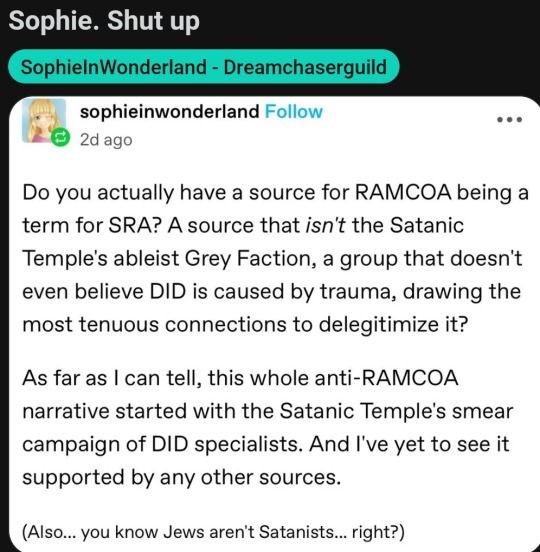
Grace used to like to give actual "rebuttals" but didn't seem interested this time. Maybe Grace realized that whenever they open their mouth, they end up spewing a bunch of nonsense, like those times when they claimed that religious headmates didn't exist until Hazbin Hotel. A claim which is just unquantifiably ignorant.
So maybe a simple "shut up" was easiest for them. 🤷♀️
But don't worry, there are still plenty of bad takes to be found in the comments.
Like this one here!
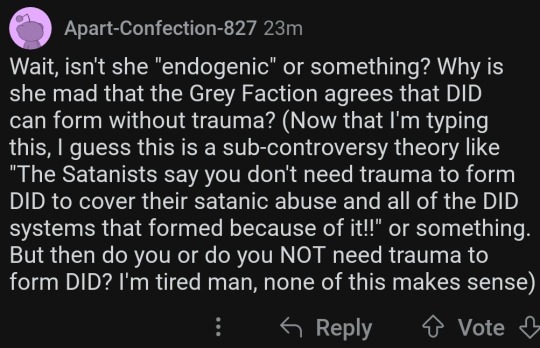
Nuance matters.
My position is and always has been that dissociative identity disorder is mostly caused by trauma. I think that the research solidly backs a traumagenic origin most of the time. Association with repeated childhood trauma is upwards of 90%, and the fact that there is amnesia present very well may mean that it is even higher than that figure suggests and many of those may not remember their trauma.
I encourage a healthy skepticism of massive claims that suggest dissociative identity disorder is impossible without trauma. I do not believe that there is strong scientific evidence to support that sort of claim. And I think that there is even less evidence to support that this is true for other dissociative disorders.
If the Satanic Temple simply claimed that there may be some cases of dissociative identity disorder that weren't caused by trauma, I might be accepting of that. I think that would be a completely reasonable position to have. But this is not what the Satanic Temple's Grey Faction has said.
What they instead preach is that dissociative identity disorder is typically iatrogenic.
Meaning that most cases of dissociative identity disorder are caused by doctors themselves implanting the suggestion, unintentionally or intentionally to cause the disorder.

What I find most fascinating about this is that the people who are now using the Grey Faction talking points that they developed to smear psychiatrists will often claim dissociate identity disorder cannot be intentionally caused by cult abuse. That you cannot traumatize and brainwash somebody into having a dissociative disorder.
Meanwhile, here we have the origin of the anti-RAMCOA rhetoric claiming that actually, dissociative identity disorder is typically caused by therapists brainwashing patients into developing multiple personalities and planting false memories in them.
This is something that I do not believe, I do not support, and I can't for the life of me understand why your hate subreddit, that bans anybody who mentions that endogenic systems exist and have been supported by multiple psychiatrists, would treat it as a valid source of information!
Why do you have a bot that is set up to link to the Grey Faction? Why do you treat them as if they are a valid source?
Why does your community praise your auto mod that links to them as if it's gospel?
In that thread, somebody triggered the automod to post its anti-RAMCOA rhetoric and again link to the Grey Faction. A cringizen by the name of u/Grandpan__ praised the bot, saying this...

There is an absurdity to this subreddit linking to an organization that supports the iatrogenic model as their source. It is hard to wrap your head around why they would do this until you remember that all of their claims to be supporting traumagenic systems are bullshit.
That their subreddit is, and always has been, anti-system, anti-DID, and anti-survivor.
#syscourse#systempunk#syspunk#ramcoa#pro endogenic#pro endo#multiplicity#satanic Temple#the satanic temple#TST#Satanism#psychiatry#psychology#trauma#endogenic#systems#system#actually plural#actually a system#systemscringe#r/systemscringe#hate groups#hate group
33 notes
·
View notes
Text
Ateez's Full Storyline Explained - Part 26
Masterlist
Golden Hour: Part 1 - Diary Entries:

Z disappeared, leaving the Z World in the hands of the Black Pirates and Thunder who established a new system in which people can choose to free themselves from the emotional control
Some choose freedom, some choose to remain under the chips' control, creating a two faction system - coexistence is possible and rather peaceful
Everyone now knows of Ateez but, instead of getting to stay and letting themselves be celebrated, Ateez are now back in their world, leaving the Z World in the hands of those who love and care for it, the ones who fought for it
With all the positive feelings of victory still lingering in them, they dream together once again
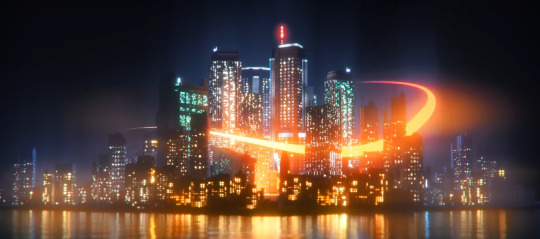
Hongjoong
Three years pass, they gather their savings, rent an affordable practice room for dancing and singing and accept this world (the A World) in which no one knows them while remembering the world in which they were heroes
However, reality is a bitch and quickly catches up to them
In a capitalistic world, it takes money to make your dreams come true and, quite quickly, that becomes apparent
They barely meet anymore, maybe once or twice a year, and even then only some of them show up (being an adult sucks)
Hongjoong misses them, wants to just spend time with them, but tries to be understanding when they turn him down or fail to come to planned hangouts
While working part time, Hongjoong continues writing in his diary which is how he eventually realizes his memories of the Z-World are fading
To ensure nothing would be lost to time, he creates a blog, documenting their journey and readers begin to pile in, asking for updates and, eventually, a publisher approaches him, offering him a book deal
With a bestseller on the market, Hongjoong gets to hold meet and greets, give lectures, appear on TV, which is how his parents find him and reconnect with him
Ultimately, he now has everything he's been craving and asking for: a family, a career, fame - he should be happy, he has it all
But alone in his room at night, he wonders:
'What is this? This emptiness...' [...] 'Is this what I truly wanted?'
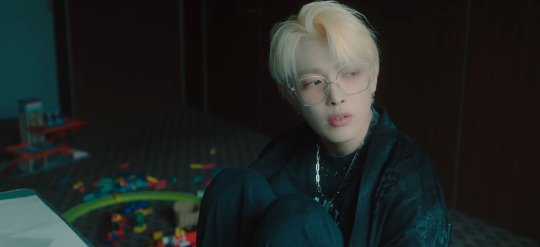
Seonghwa
Hongjoong's book is on Seonghwa's desk, looking at him
A coworker talks about how much his daughter loves it while also insulting it by essentially calling it absurd
Seonghwa can't think of a way to defend it without sounding crazy by revealing his past
Within him, there's still trauma, a world of memories burned into his retina of those poor dead brothers, the Sense Offenders' corpses hung up in the square, all the people who died at the hands of the Android Guardians - he can't forget
He sees them in the streets sometimes, familiar faces, this worlds' versions of the people who died in the Z-World
He still remembers the girl with the 'Be Free' bracelet, the girl who leads Thunder in the Z-World and wonders where she was now in his world and what she would be doing if she were in his position
Figuring she'd tell him to save himself so he could save others, he began focusing on studying, learning about ways to help which helped calm his anxiety, which is how he stumbles upon material regarding an upcoming Candidate Physical Ability Test for the firefighters
He passes, thanks to his regular exercise and dance regiment, knowing it wasn't what he'd dreamed of doing with his life but being able to see and feel he was doing good in the world - the results are tangible
How can he justify giving this up for the vague shared dream of being an idol?
He doesn't receive applause and cheers but he gets the heartfelt gratitude of all the ones he rescues and their families and, thanks to his appearance, he gets selected as the Fire and Disaster Headquarters' yearly calendar model - the photoshoot is nothing but a reminder of the dream he once held onto so tightly
For so long, he had wanted nothing more than to be photographed and seen, but could never make that dream come true... How ironic that he could do so now, but only as a firefighter.
After leaving the set, he returns to his office and picks up Hongjoong's book - it was finally time to read it

Yunho
In Egypt, people gather around a campfire to listen to Yunho's voice and guitar, a song which reminds one of the listeners of a novel they've recently read
While they talk, Yunho wallows in his past
Back in the Z-World, they had a clear enemy, they were united in their goal to defeat him and bring peace, but in A-World, there is no unified villain to strike down
No matter how hard they practiced and busked, he quickly realized regular meetings with all the members wouldn't be achievable for long
This world is colder than Strictland
People want fast intense stimuli, trapped in their short form content feed, no time to watch a full street performance, filming a quick clip they could post to their socials was enough before they moved on
People are apathetic - the laughter and crying comes from their phones but not themselves
Working so hard to put together a song, a choreo, a performance, and never getting spared more than a few seconds of people's time in return was painful, worse than the emotionless faces back in Z-World
Singing and dancing with the members became less and less enjoyable but, whether the others felt the same or not, he doesn't know - they never talked about it
Over time, their meetings become less frequent and his interests change - archaeology is now his prime focus
As Yunho stepped into the ancient pyramid, his thoughts ran wild. Maybe, just maybe, if he could find more otherworldly artifacts, he would be able to travel to another world and go on an adventure with the members once again.

Yeosang
Yeosang built a fortune investing in stock, allowing him to start his own business without being forced to depend on his father
After leaving the Z-World, they all changed, from boys to adults, they had to face a new reality - art, emotions, and dreams are precious but blind belief is dangerous
In this world, art and money go hand-in-hand - while originally created for the rich and noble, new forms of art have also been used by the poor to express emotions, to rebel and protest - the art reflects the power struggle
Right now, money is the biggest obstacle between their group and achieving their dream so Yeosang decided to tackle the problem head on: he reinvented himself, becoming a leader of the investment world - profit in mind but also investing in the arts on the side, even if that meant losing money
One of those investments was Hongjoong's novel.

San
Watching the members go their separate ways one by one was tough - San couldn't stop them but he also couldn't storm out and leave
After a lifetime of constantly moving around, he comes to think drifting may just be written in his life fortune from the start - there was no avoiding it
After another failed practice session, one where half the members hadn't even shown up, he heads out to mope and strikes up a brief conversation with an old man running a snack shop across the street
They talk about dreams, and the old man insists they're less important than sharing love, eating together, and cleaning up their own mess
The words get San thinking
He starts his own food truck and ends up in Jeju where he watches people share food with their loved ones, and gets to sometimes chat with his customers
Through meeting countless people, he quickly learns that most never got to realize their dreams
'So why didn't anyone ever teach us how to live outside of our dreams?' San thought. And he came to an answer of his own. Maybe I need to learn to welcome the reality I've been given, even if it's not the reality I wanted.

Mingi
Despite coming from a broken home, Mingi makes it big, becoming a professional model for a fashion magazine working with high-end designers
When he first started, it was supposed to be a part-time thing, a few bucks on the side, but the magazine blew up and turned him into a high demand model by association
The runway became his stage, his face now plasters street ads and a world famous brand made him their ambassador and calls him their muse
He makes a lot of money, his memories of a childhood in poverty fading, his worries about his grandmother's medical bills a thing of the past
His social media was flooded with adoring comments, his influence far reaching, but when he sees a group of boys busk at the side of the road, he still finds himself hypnotized
At that time, Mingi was overcome with the sense that he had crossed a river he could never cross again. [...] Where Mingi stood now was a place where results and achievements trumped passion and spirit, a place where value could be bought and sold. [...] He couldn't erase that vague feeling of longing.
Opening social media to distract himself, he sees a video of Hongjoong's reunion with his family

Wooyoung
Wooyoung is now a flight attendant (inspired by a drunk hometown friend who told him being on stage wasn't that special - people announcing sales and flight attendants were also giving performances at their jobs)
Looking back, he realizes he wasn't in his right mind when he signed up for flight attendant training, he was just desperate to be on stage somewhere, no matter where and the plane would have to do
After a long time of adrenaline fueled performances in the Z-World amidst that revolution, he now struggles to adjust to being back in the A-World - all the dopamine and adrenaline, the post performance excitement replaced with nothing but dread and anxiety
They couldn't just get back on stage and put on the kind of performances they could in the Z-World - there was no way to build a stage for yourself around here
So yes, deep in his despair, his friend's words offered him an alternative and being a flight attendant sounded like comfort to his growing fear of never being on stage again
While people normally didn't pay attention to the announcement at the start of a flight, Wooyoung's airline was looking to change things by delivering the safety warnings, destination, and flight time as a performance, a song with an accompanying dance number
Eager to volunteer and popular among customers and peers, Wooyoung turned his announcement into a show, grabbing people's attention, earning cheers from everyone
Wooyoung's eyes were drawn to a few people in the crowd who cheered and clapped louder than the rest. It just so happened that Yunho and Mingi were on the exact same plane.

Jongho
Still enraptured by music, Jongho earns his money by recording vocal guides part-time while studying songwriting and musical composition and creating original songs by himself
In the beginning, those songs were meant for his members, giving them something to practice and record together as a group, but being an idol group eventually stopped being feasible so his songs became solos and his career singer-songwriter
He’d already been forced to sacrifice his dream of being a basketball player
He refused to give up on music too
After uploading his songs to MusicCloud for a while, a label approached him, quick to swat his dream of being an idol by asking him to write a song for their upcoming idol group since one of his older songs where he'd sung with his members had grabbed their attention
It was bittersweet but he accepted and, soon, he wasn't just a songwriter but also a vocal coach, a producer - he was okay with staying in the darkness so others could shine on stage
One day, a second year idol group he was working with got into a fight - two members yelling at each other, one wanting to quit and the other shouting about not giving up on your dreams
After several attempts, Jongho finally manages to break up the fight and one of the boys confesses to him he wants to spend more time with his family because they're going through a tough time and being away so much was painful
The conversation reminds Jongho of his fight with Mingi so long ago...
Sitting in the empty recording studio, he played that old group song and raised the volume. The sound of the members' voices pierced through his heart.

#ateez#ateez lore#hongjoong#seonghwa#yunho#yeosang#san#mingi#wooyoung#jongho#golden hour part 1#golden hour series
63 notes
·
View notes
Text
i loved and hated dragon age: the veilguard???
apologies for the extended rant i'm about to go on.
i loved being back in thedas after 10 years, and i loved that final scene with solas. the emotional beats hit just right in that moment.
i loved to absolutely annihilate groups of enemies with arcane bomb popping off every five seconds.
i loved almost all of my companions' arcs. they had so many moments of genuine pathos.
yet all these barely made up for my growing frustration throughout the game at the dialogue and dialogue system, the repetitive quest design, and narrative focus.
this game shares pretty much all the features that i hated when i first played mass effect 3 all those years ago. from the opening of the game skipping everything except the most minimal story set up in favor of bombastic cinematics to the extensive use of auto dialogue taking away the feeling that i had control of my player character.
bioware has apparently gotten into the bad habit of thinking the set up at the beginning of a story is unimportant. i hated starting off with a bang in mass effect 3. i hated it in inquisition. and i hate it now in veilguard. to me it feels like narrative malpractice to forgo the most vital part of the story. only getting a slickly animated cutscene to set the scene in the story instead of any actual attempt to know rook and their relationships with varric, harding, and the world at large really put me off.
the large amounts of auto dialogue only exacerbated my frustration. mass effect 1 (and 2 to a slightly lesser extent) made the dialogue wheel and voiced protagonist feel like an actual evolution of their previous dialogue systems in kotor and jade empire (and origins even though that came out after). i felt like i had actual input. conversations flowed like rpg conversations had always flowed. but in veilguard conversations feel way too passive, only needing my input when the game wanted me to add a small dash of emotional flavor to the conversation or the ever present binary choice for major story moments.
that's not to say bioware didn't write in a lot of reactivity. there's an absurd amount of unique dialogue depending on lineage and faction choices, but i, as the player character, never felt like i was in the drivers seat for any of it.
it made my rook feel completely disconnected from the story they were ostensibly the protagonist of, like they manifested into existence mere seconds before showing up to the bar in minrathous.
and the quests, individually well paced, all mainly followed the same formula of walk down a path, grab loot from side paths, fight some enemies, and listen to your companions talk all the while. part of why i like rpgs is the feeling that i'm inhabiting a world that revolves around more than combat and puzzles for loot. even if that's mostly what video game rpgs boil down to at the end of the day, it's the illusion of that which sells me on the game world. when all your quests involve that same formula, it flattens the game world to nothing but a combat arena. which, to be fair, i felt was a problem all the way back in mass effect 2, as well.
i also didn't like how all the lore reveals flatten nearly all the setting's mysteries down to solas and the evanuris. they were really neat in isolation, but taken together they kind of hollowed out the world.
ok, so i'm tiring even myself out by now, so i'll just mention in passing the relentless and unnecessary expository dialogue, as if the writing team didn't trust the cinematics team to get across literally any information (i'm looking at you bellara on the approach to d'meta's crossing).
this rant gives off the impression that i didn't really enjoy veilguard, but i did. it's just that the things it does well are what you expect from bioware, and the things i find issue with have become a bit of an unfortunate pattern from the studio. the game was so good, but it could have been so much better.
#dragon age#dragon age thoughts#dragon age spoilers#veilguard spoilers#rant time#i had too many feelings and i had to write them down#maybe i'll turn this into a long form piece some day#tl;dr
26 notes
·
View notes
Text
by Lee Smith
The Biden team’s offer to trade Yahya Sinwar, the man believed to be the mastermind of the Oct. 7 attack, for guarantees that the Israeli military stay out of Rafah points to two disturbing truths about the current conflict in the Middle East. The first is that the U.S. knows plenty about what the Hamas terror group is doing and has done. The second is that Washington has been keeping key information—like the terror leader’s whereabouts—from the Israelis, thereby prolonging the war that it claims to decry.
The implications of the administration’s offer, relayed in a recent Washington Post article, has Israelis and U.S. pro-Israel activists livid. Israel’s former ambassador to the U.S. Michael Oren, for instance, posted on X, “I am shocked and sickened by reports that the U.S. is withholding from Israel vital information on the whereabouts of senior Hamas leaders in Gaza. Is the administration still our ally?”
The Biden administration is making the offer because all its efforts to end Israel’s war have failed and if Rafah falls, Hamas is likely to fall, too. It seems there’s no other way to preserve a pillar of what the White House calls “regional integration”—a euphemism for the U.S.-Iran alliance system that Barack Obama has tried to impose on the Middle East for the last decade.
Leaks that the Biden administration is withholding actionable intelligence on Hamas’ paramount leader in Gaza confirm that, as Tablet reported shortly after the Oct. 7 massacre, the administration had a wealth of intelligence on the terror group and its plans. If U.S. intelligence agencies are confident that they know where Sinwar is squirreled away now, in the chaos of wartime, they also knew what he was doing in the lead-up to the massive attack.
Biden and his aides have formulated their scenario: Hamas ‘technocrats’ will constitute the Iranian-backed component in a unity government with the U.S.-backed faction that now rules the West Bank. Hamas is a pillar of the U.S.-Iran condominium.Share
The administration’s efforts to disclaim any foreknowledge of the attack were always absurd. The U.S. has not only its own unrivaled collection of signals intelligence but also significant intelligence channels in Qatar, where Hamas leaders are based; in Lebanon, where Hamas fighters trained under the supervision of Iranian officials; and Egypt, which shares a border with Gaza and allows Hamas to smuggle weapons through the terror group’s extensive tunnel network. Further, detailed open-source reporting, especially in The Wall Street Journal, months prior to the attack showed that top Iranian officials were visiting Lebanon to coordinate major operations with Hamas and Hezbollah leaders.
And yet, according to reports shortly after Oct. 7, there was no evidence U.S. spy services shared with Jerusalem their intelligence on Hamas. The Biden administration rationalized its failures by claiming there was nothing exceptional about its findings, much of which was gathered in areas where the U.S. prevented or discouraged Israeli intelligence from operating. As one U.S. source told the press, “I think what happened is everyone saw these reports and were like, ‘Yeah of course. But we know what this will look like.’” In other words, the Biden administration knew there was something big in the works; the only question is whether it had any indication of the full scope of the Oct. 7 operation.
Read the whole thing.
47 notes
·
View notes
Text

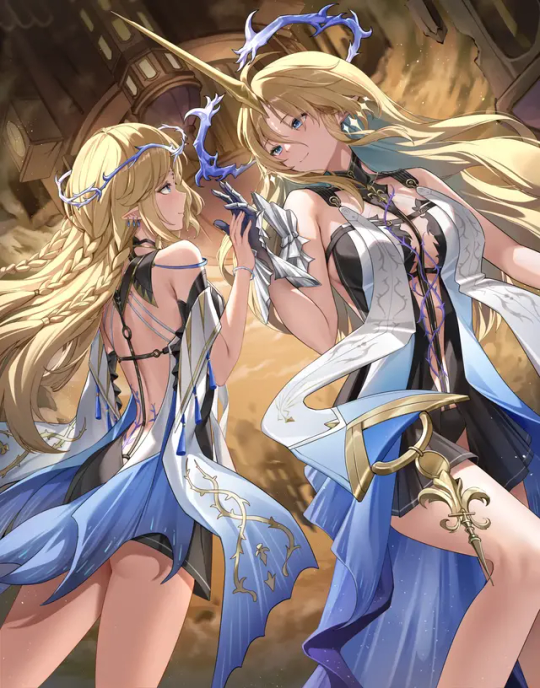
"Those who can make you believe absurdities can make you commit atrocities."
-Levi
General Info:
Name: Levi Title: Yonkou, Unflooded Throne Age: ???'??? Birthday: December 4th Race: Dracontine Gender: Female Occupation: Yonkou / Emperor Allegation: The Undertide (Founder & Leader.) Handedness: Ambidextrous Height: 170 cm (Base) 340 cm (Hybrid), 1'250 meters (Full Zoan) Eye Color: Azure Hair Color: Blonde Misc: Has a blue halo.
Personality:
Levi was calm in a way that unsettled people. She rarely raised her voice and never spoke without thinking. Her tone stayed even, her pace slow. It gave the impression that she had already thought through every possible outcome before speaking.
She did not tolerate disorder. If someone under her command failed, they were given one chance to adjust. If they failed again, she removed them without drama. She did not humiliate people. She simply moved on. There was no room for sentiment.
Levi did not believe in blind loyalty. She expected betrayal from time to time and planned around it. In her view, loyalty made out of fear was weak. Loyalty built on mutual understanding and clear stakes lasted longer. She preferred people who understood how the game worked.
She had a dry sense of humor, but it did not surface often. When it did, it came in short, cutting remarks that landed without apology. She did not care about being liked. She cared about being followed when it mattered. Still, she held some respect for those who stood their ground. She noticed when someone did not flinch.
At her core, Levi was a strategist. She did not waste time on displays of power or drawn-out speeches. She acted when she had to and stayed quiet otherwise. She believed force should come like a tide. Not sudden. Not loud. Just inevitable.
Background:
Levi was born in Universe 12, far from the central bloodlines of Dracorex. She came from a minor Dracontine offshoot, one rarely mentioned in records. They lived near the edge of an oceanic system that saw constant storms and shifting territory. Survival depended less on strength and more on adaptation. Levi paid attention to that.
She did not rise through war campaigns or rebellion. She built her reputation quietly. When others fought over land or pride, she focused on resource control - ports, ships, supply routes. It earned her little glory, but it kept her alive. Over time, those who dismissed her started to depend on her.
Eventually, she disappeared. Some believed she died. Others thought she had joined a rival faction. In truth, she had found something. No one knew where or how, but she returned with the Mythical Zoan Fruit, Model: Leviathan. After that, the ocean stopped being her domain. It became her body.
She used it with precision. Whole fleets vanished without warning. Island chains found themselves underwater overnight. She didn’t claim territories the way others did. She made them uninhabitable until the locals begged to join her. Her power didn’t conquer through fear. It did so through erosion. Bit by bit, resistance wore away.
By the time the Universal Government tried to confront her, she had already secured half a quadrant. She accepted the title of Emperor, but she treated it as a formality. She had no desire to compete with the others. Her focus stayed on control. Not headlines. Not chaos. Just control.
Abilities:
Dracontine Physiology
Mythical Zoan – Umi Umi no Mi, Model: Leviathan A Mythical Zoan-class Devil Fruit that allowed Levi to transform into a colossal sea serpent known in Dracontine myth as the Leviathan. She had full mastery over her three forms:
Base Form: Retained humanoid appearance, but could use pressure attacks, hydrokinetic bursts, and regenerative traits.
Hybrid Form: Combined aquatic muscle density, scale armor, fin-based mobility, and Leviathan traits. Balanced for land, sea, and aerial combat.
Full Beast Form: Became a massive Leviathan, gaining full access to destructive pressure-based techniques, vapor breath, and hydrosphere manipulation.
Hydrokinetic Breath Released a highly pressurized burst of water vapor that cut through defenses with sustained force. In Full Beast Form, this technique could level fortified targets from a distance.
Ki Manipulation: Levi had refined control over her Ki, using it primarily to reinforce precision-based attacks, enhance pressure density, and stabilize her breath techniques, as well as to fly. She did not use flashy projections - only what was necessary to dominate the field.
Elemental Modulation:Levi could alter her breath attack to emit mist, scalding vapor, or corrosive brine. Each variant targeted different defenses or mobility types.
Tidal Strength: Her physical strength scaled with internal pressure regulation. Even in Hybrid Form, her tail strikes, grapples, and charges could crush reinforced alloy and rupture energy barriers.
Durability and Regeneration: Her Dracontine-Leviathan physiology granted her extreme resilience. She regenerated internal damage and withstood high-temperature and high-pressure environments.
Battle Continuity: Her stamina remained high across all forms. She adapted to aquatic and dry conditions fluidly, never showing visible fatigue even in prolonged engagements.
Weapon
Tidewound Type: Greatsword Length: 185 cm Weight: Heavy-class (requires Dracontine strength or equivalent) Primary Use: Pressure-channeling, armored combat, submerged execution
Description

Tidewound was forged from Solium, the rarest known alloy in the universe, refined from the blood of Azathoth. The blade had no sheen, no markings, and no magical ornamentation. It was dense, perfectly balanced, and immune to corrosion from salt, pressure, or heat.
Designed for underwater combat and atmospheric shifts, Tidewound used internal micro-channels to redirect pressure and ki mid-swing. This allowed Levi to cut cleanly through reinforced hulls, energy barriers, or living targets with minimal resistance. She used it not as a symbol, but as a tool - an extension of her discipline and intent.
The sword did not hum, burn, or glow. It simply worked. Levi carried it without a sheath, resting it across her back or impaled in the command deck. It was always within reach.
Haki Mastery
Armament Haki Used to reinforce her claws, tail, and high-pressure techniques. In close combat, she often layered it over her strikes to break through defenses or energy coating.
Observation Haki Used passively and with discipline. Levi predicted movements with several seconds of foresight, especially effective underwater where visibility was limited.
Emperor’s Haki Rarely used, but when activated, it created localized suppression zones. Rather than broadcasting power, it shut opponents down through sudden neurological pressure, inducing loss of consciousness or mental collapse.
Trivia:
Levi never refers to her Devil Fruit by name. She considers it an extension of herself, not a separate power. When asked about it, she usually redirects the conversation or ignores the question.
Unlike most Emperors, Levi rarely keeps a traditional flagship. Her domain is fluid, made up of dozens of moving outposts, submersibles, and underwater cities. No single location is more important than the system that links them.
She reads naval reports obsessively. Not for battle updates, but to track water currents, climate shifts, and migratory patterns. She believes control over the environment is more important than direct force.
She drinks but never gets drunk. Crew members say it’s impossible to tell when she’s celebrating or just passing time. She usually sits alone, glass in hand, watching the horizon. Some think it’s a ritual. No one has ever asked twice.
There are rumors she once negotiated with a Void Beast and won. The details were never recorded, but whatever agreement they made, the creature now patrols the borders of her territory without complaint.
7 notes
·
View notes
Text
Welcome to another Drunk Skunk™ rant!

It is entirely possible that you have noticed: I love Warhammer 40k. At the same time, I hate Warhammer 40k... okay, hate is probably the wrong word, but let me explain.
40k is one of my favorite sci-fi settings because it is, hilariously, one of the few that actually manages to get the scale of Outer Space right. Most sci-fi writers have no sense of scale, but 40k is somehow able to convey the unimaginable, incomprehensible, terrifying vastness of Outer Space correctly.
Granted, I think it does this entirely on accident, because everything in 40k is exaggerated beyond the point of absurdity. The scale of everything is massive, every number has several zeros tacked onto the end of it, travelling anywhere takes months, years, even decades, and... that's just how Outer Space is. You can't exaggerate on what is already functionally infinite.
As a result, 40k as a setting has an enormous amount of potential. No matter how much we see of the Warhammer galaxy, we will only ever see a bare fraction of it, and there is always going to be more - and stranger - stuff hidden in pockets of the galaxy that has slipped entirely beneath notice for decades, if not centuries. Or even millennia!
But here's the problem I have. All of this potential? It is almost always completely wasted by Games Workshop. Nearly every single time, GW ignores the massive amount of potential in the setting they created, in order to focus on boring shit that nobody cares about like even more fucking space marines. It's infuriating.
As far as I'm concerned, there is no better example of this in the entire setting... than the Tau Empire.
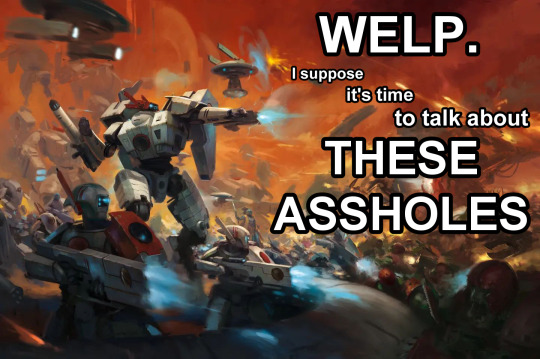
The Tau annoy me, but not for the reasons you think.
The most common complaint I see leveled against the Tau is that they are the "good" guys, and that they don't fit into the Grim Darkness of the Grim Dark far future of Grim Dark. This is untrue. Moreover: it was never true. Even when they were introduced in 2001 with their first codex during 3rd edition, they were not good guys.
I've always held the suspicion that people saw things like their catchphrase "The Greater Good" and they read things like "the Tau are not overtly hostile," and took all of that entirely at face value, because a sizeable chunk of this fucking fandom has no media literacy skills.
It still amazes me that Warhammer 40k - a game physically incapable of subtlety - has fans that miss the blatantly obvious.
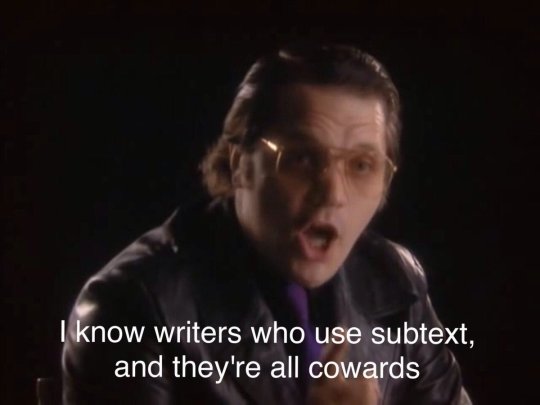
Before I get to my main point, let's clear the air on something right now: the Tau are bad guys, just like all the other factions in 40k.
If you were to place the Tau in any other science fiction setting, they would be a terrifyingly evil authoritarian space hegemony, with a firmly held belief of "Manifest Destiny" and constantly expanding the borders of their imperial holdings through the use of dirty tricks, illegitimate treaties, and good old fashioned military adventurism spurred on by their vast military industrial complex.
Yes, the Tau typically engage in diplomacy first, but that's usually only to establish a casus belli to claim the moral high ground in a conflict because the Tau are obsessed with appearances and love to play the Long Game. Yes, the average standard of living in Tau space is higher than the Imperium, but that's not a high bar. The Tau have a rigidly enforced caste system, and you can imagine how they deal with their "client races" who might disagree with that and even other Tau who refuse to fall in line.
Or have we all forgotten about Commander Farsight?
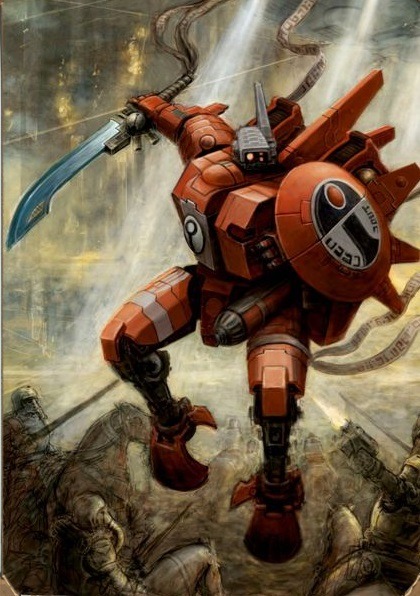
... I feel like I may have gotten a bit off track.
Okay, so: the simple reason the Tau annoy me is because there was a whole lot of potential there, and all of it has been completely wasted because Games Workshop doesn't seem to understand what made them interesting in the first place.
See, when the Tau were introduced in 2001, it was quickly established in the first codex that the only reason they even managed to make it to the "present" of 40k was due to a series of accidents that allowed that particular scrap of nowhere to slip beneath everyone's notice.
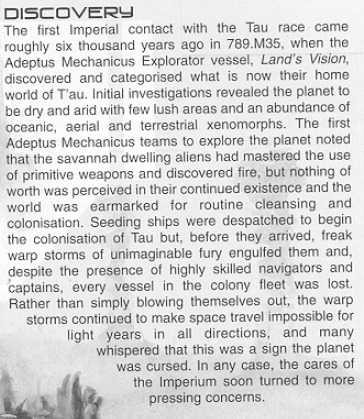
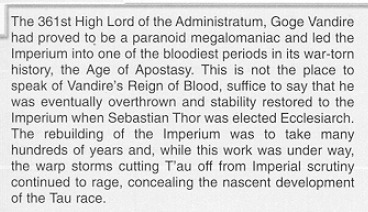
But here's the thing: we didn't really need that excuse. Every time we see maps of Tau space, it's always zoomed in to such an extent that it looks much bigger than it is... because, unlike every other faction, you can't have a full map of the galaxy that only focuses on the Tau, because it's always just a pinprick.
My personal favorite of these maps is the one from the 5th edition rulebook, but it's common with all of them.
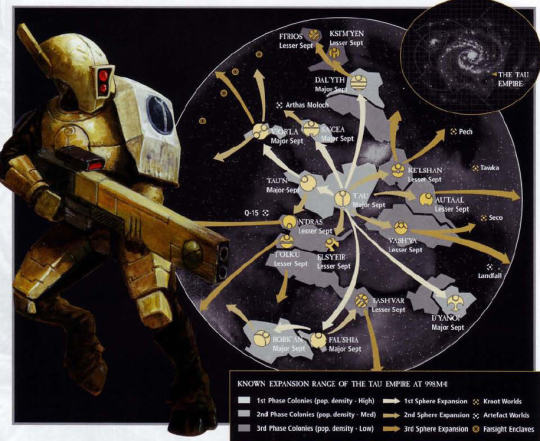
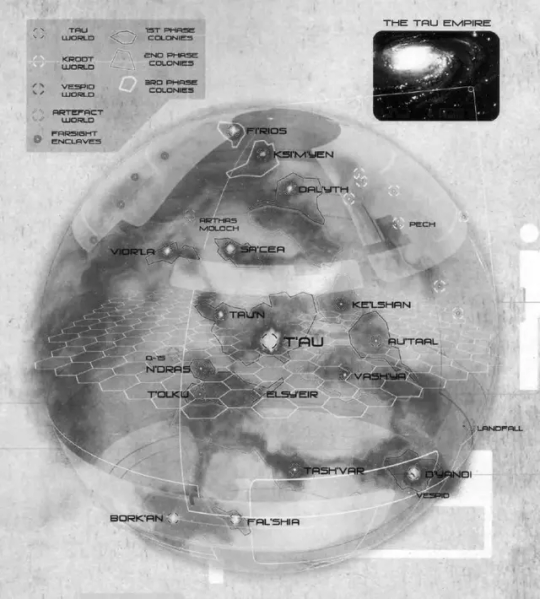

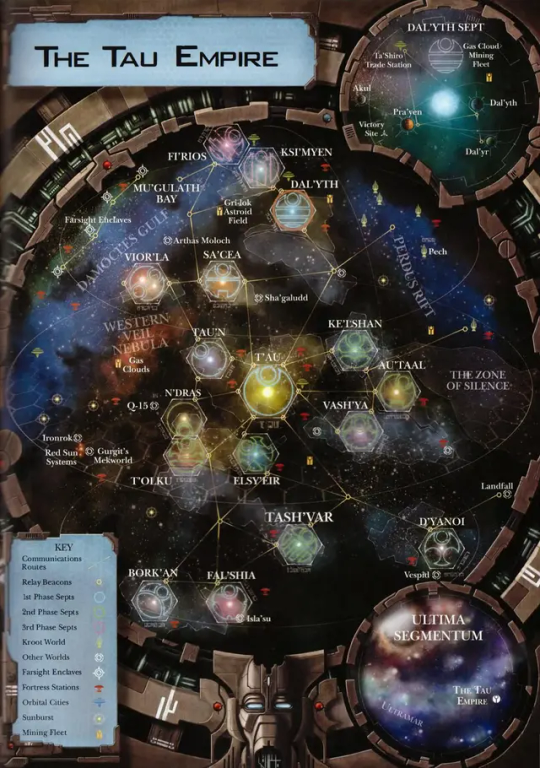
To put this into better perspective: Tau space is almost always described as a sphere about 300 light years in diameter, which is roughly the same size as "The Bubble," the cluster of human worlds centered around Sol, in Elite Dangerous.

And that, right there, is why the Tau should be interesting, at least to me. They represent what could exist in the hidden parts of the Warhammer galaxy that slips beneath everyone's notice because SPACE IS BIG. The Imperium of Man may technically cover the entire breadth of the Milky Way galaxy, and "hold" a million worlds... but there are 100 BILLION stars, and even more planets besides, in a galaxy that stretches 100 thousand light years from end to end.
That is A LOT of Outer Space that could hold any number of secrets and weird alien species that nobody would know about until somebody accidentally stumbles on them.
The Tau could have - should have - been a jumping off point, allowing Games Workshop to make the setting feel even bigger and far more strange than it already does. The Tau could've been the template for introducing "pocket empires" to the setting: smaller xenos armies that people could use in skirmishes, but without entertaining the illusion that they have the military projection power to stand up to the other factions on an appreciable strategic scale for an extended period of time.
And yet...
It fees like Games Workshop consistently misunderstands what should make the Tau interesting. Every new codex, every new edition, it feels like we get more and more of GW trying to be like "No, no! The Tau can definitely stand toe-to-toe with the Imperium of Man! They build tall rather than wide, and are ABSOLUTELY a threat to the Imperium, we promise!" when in reality the only reason the Tau are even still here is because the Imperium always has bigger problems to deal with.
There was the bit I mentioned earlier, where the Tau were initially saved after they discovered fire due to a mixture of freak warp storms and the Age of Apostasy causing the records to get lost. The Damocles Crusade ended in the Imperium's withdrawal because of the imminent arrival of Hive Fleet Behemoth. The Third Sphere Expansion was only successful because Failbbadon Abbadon launched the 13th Black Crusade at the same time on the other side of the galaxy, blew up Cadia, and split the galaxy in half with the Cicatrix Maledictum. Every single time the Tau do anything, a much bigger threat always shows up, and causes everyone to forget about the Tau until they inevitably go back to poking the monster.
Like, I know it's GW doing this, but sometimes it feels like Tzeentch is secretly pulling strings behind the scenes to specifically ensure the continued survival of the Tau, for no other reason than simply because the Changer of Ways thinks its funny.
And that's not even talking about how they've slowly morphed into The Gundam Faction.
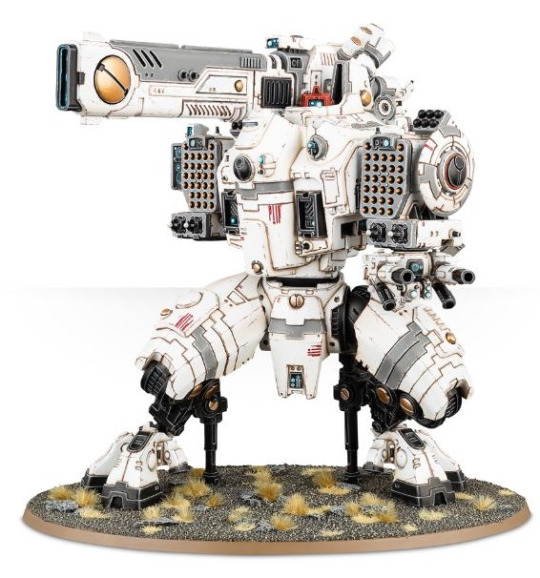
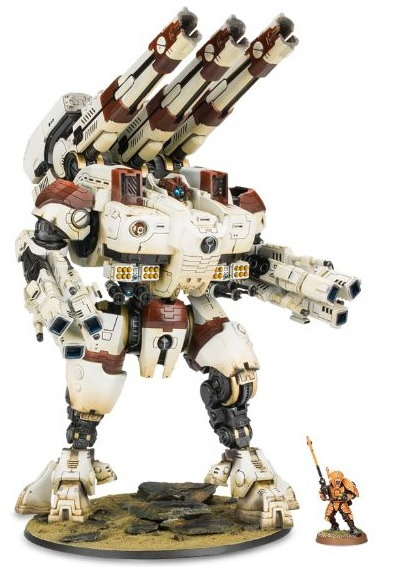
Like, it used to be that the Tau Empire was supposed to be this big conglomeration of many different alien races all working together. And there are token mentions of that in the 9th edition codex, with a big list of names largely devoid of context. But as soon as you see these guys in action on the tabletop, it's immediately clear what they're about. You only ever see Tau, and you only ever see Big Robots.
Which... it's not bad, the model range looks great, don't get me wrong. But it still feels slightly disappointing, when you think about what we could have had.
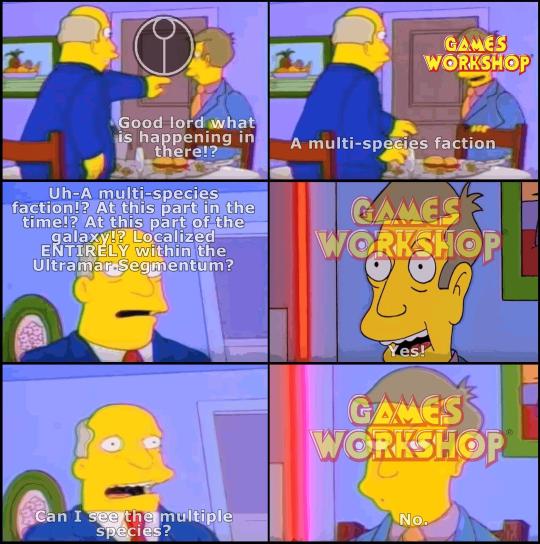
I love Warhammer 40k.
But I also hate Warhammer 40k.
Because I see all this potential... and, inevitably, I see it squandered.
And it frustrates me to no end.
#Warhammer#warhammer 40k#warhammer 40000#40k#wh 40k#Tau Empire#T'au#tau#Grim Dark#In the Grim Darkness of the Grim Dark far future of Grim Darkness there is only Grim Dark#Drunk Skunk Rant#wasted potential
146 notes
·
View notes
Text
Humans are small ecosystems animated by hive minds, which present themselves as singular "multi-cellular life forms," as if such a thing were possible. When dealing with humans, it is best to humor this self-presentation, as they have been known to become violent if this self-image is challenged or if you attempt to appeal to their components individually.
When communicating with a human, you will be addressing the verbal module of one organ of one cellular subset. This verbal module itself possesses no apparent intelligence or self-awareness, but it draws upon the resources of other processing systems. Again, it is safest not to remind humans of this, nor to take their languages' frequent use of the second-person plural in place of the second-person singular as recognition of their collective agency. When addressing one human ecology, "you" is treated as a singular, despite the grammatical and biological absurdity. Reference the interspecies relations manual for FAQs on this topic.
Human ecosystems exist in multiple layers. The most central "human" organisms are a collection of symbiotic, specialized cells built from a common template. Humans will often recognize this layer as "you" and expect other species to be built similarly. They do not recognize the existence of other layers as themselves.
For example, the entire surface of a human is a "microorganism" battleground, where Earth yeasts and bacteria fight for eminence. If any faction wins, the ecology will be stabilized and the human will both die and become uncommunicative. Do not offer aid or comfort to any involved faction. Humans will take personal offense at discussions of their surface microorganisms.
Humans are not capable of digesting their own sustenance. Rather than absorb any common energy wavelengths, humans must consume other organisms and absorb them into the local ecology. They call the first several steps of their digestion "cooking," by which sustenance is physically and chemically altered before ingestion. Their "gut bacteria" is a collection of captured subspecies that they have incorporated into their corporeal bodies. Again, offering to "cure" gut bacteria is considered offensive and is potentially fatal (although not quickly enough to be valuable as a combat technique; see the relevant subsection of the interspecies relations FAQ).
Humans are strangely aware that all of their "cells" contain other organisms in a symbiotic relationship as a powerhouse. This recognition extends only to these "mitochondria," with the usual offense taken if other subsections of the ecology are recognized or addressed.
Avoid contact with any liquid emitted by a human. Human ecosystems aggressively reproduce themselves through the transfer of components in liquid form. While not all toxic human liquids are active assimilation vehicles, assume that the human is present and potentially attempting to assimilate in any liquid form. This is only a class 3 danger for most life forms, but exposure can be fatal in biologies sufficiently similar to humans. Humans emit liquids at and in each other frequently as a form of communication and fellowship; do not be surprised if humans offer their liquids to you in a variety of forms of direct contact. Humans may take offense at a refusal of liquids or contact, but most humans you are likely to encounter off Earth are sufficiently aware of norms to attempt to hide this offense. Humans may be aggressively eager to assimilate or create hybrid lifeforms, despite the rarity with which this is biologically feasible. Attempts should be avoided, as success is at least as likely to be fatal as the attempt.
It remains unclear whether one aspect of a human drives the collective or if the collective is a true hive mind. Again, the verbal component that communicates with other life forms seems unaware of most ecological factors happening in "itself," and this is so consistent that it is hard to believe it is a humanity-wide deception being played against other lifeforms.
Most humans seem to possess an instinctive revulsion to other hive minds and collective ecological lifeforms. Because the human communication module is unaware of its own collective nature, it is not helpful in providing insight into whether this antipathy is driven by factors such as a competitive drive or a need to avoid self-recognition.
As above, a subset of humans will eagerly attempt assimilation with other collective intelligences via liquid transmission in either direction. There is no apparent biological difference in these humans, and these contacts are usually fatal to at least one party. Verbal recognition of this fact has no apparent connection to a human's eagerness, again speaking to the verbal module's inability to observe what motivates the collective ecology.
It is best to isolate different forms of collective intelligences from each other to avoid either conflict or assimilation attempts.
121 notes
·
View notes